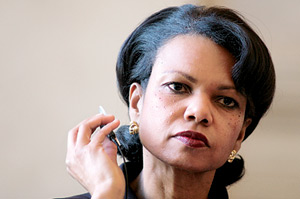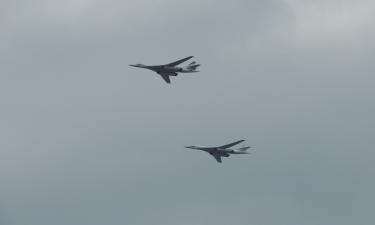Rice diplomacy
USA forces North Korea to shut down nuclear program without promising anything in return
Pyongyang will need to make a strategic decision to decline the nuclear program, US Secretary of State, Condoleezza Rice, said in Tokyo yesterday. The remark mirrors Ms. Rice's central theme of her tour in Asia. Condoleezza Rice discussed the question to resume six-party talks on N.Korea's nuclear program in Beijing last week; she visited Thailand afterwards, returned to the nuclear subject again in Tokyo and finished the analysis in Seoul today. 
Preparations to the talks regarding the nuclear program is taking place very far from Moscow. Ms. Rice's work schedule does not include a visit to Moscow, in spite of the fact that Russia is one of the participants of the above-mentioned six-party talks and one of the nearest neighbors of North Korea.
The nuclear talks were suspended 13 months ago: North Korean officials believed that suggestions from the members of the negotiations, the USA, first and foremost, were insufficient. The States supposedly required too much from North Korea, but offered very little in return, in a long-term perspective. The US administration offered to deliver fuel to North Korea in return to the cessation of the nuclear program in the Asian state. In addition, the USA promised to guarantee security to N.Korea on behalf of all members of the talks.
Nowadays North Korea agreed to resume the talks on July 25th in Beijing and distributed a statement through its propaganda agencies saying that the liquidation of nuclear weapons on the Korean Peninsula was a premortal wish of the nation's founder, the father of the incumbent leader of country, Kim Il Sung. However, Pyongyang's refusal to continue developing the nuclear program will have to be followed with adequate steps on the part of the USA.
To all appearance, Condoleezza Rice does not think that new zealous statements from Pyongyang imply a certain change of North Korea's stance on the moot question. Ms. Rice stated in Tokyo that the forthcoming negotiations would bring no results, if Pyongyang was not intended to promise to decline nuclear weapons. In Beijing, the US Secretary of State was urging the Chinese administration to show pressure on North Korea, using close economic links and other possible ties, which the two countries practice. It is noteworthy that one of the high-ranking officials of China left for Pyongyang after the talks with Condoleezza Rice.
According to Ms. Rice, the US administration does not consider it necessary to change anything in its position: the American delegation intends to repeat its suggestions, which Pyongyang rejected in June of 2004.
The talks, which Ms. Rice conducted in Japan, showed that Washington and Tokyo were sticking to one and the same, rather tough opinion. South Korea prefers to have a different approach to the matter, though: Seoul calls upon its allies to find a compromise with Pyongyang's interests. Taking into consideration the ongoing hunger in North Korea, Seoul intends to offer considerable food help to Pyongyang – 500 thousand tons of rice. In addition, the South Korean administration plans to deliver a large batch of raw materials for the needs of the N.Korean light industry, for the production of shoes and clothes, first and foremost.
Judging upon the remarks from South Korean officials, they are not sure if Pyongyang is going to be satisfied with those economic suggestions. South Korea, therefore, intends to ask Condoleezza Rice to show understanding of Pyongyang's security concerns. Apparently, the head of the US diplomacy is not inclined to promise anything until North Korea makes the required “strategic decision.”
As the U.S. is trying to affect North Korea by tough talk, Russia strives to provide that all the parties in the upcoming six-party talks on Pyongyang's nuclear program be equal in rights. Only this can guarantee progress in negotiations, Russia believes.
Subscribe to Pravda.Ru Telegram channel, Facebook, RSS!





